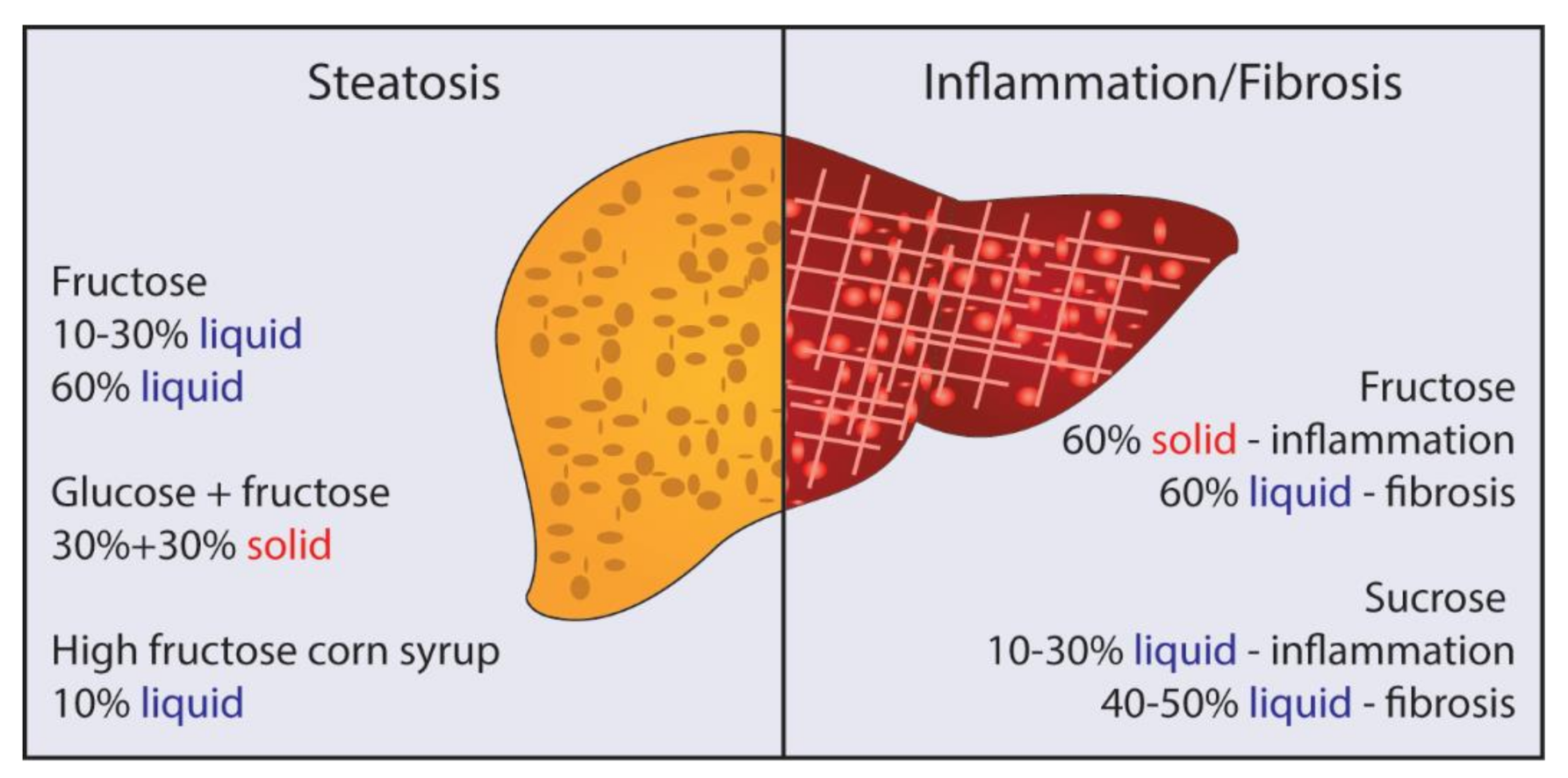The impact of sugar on steatosis, or fatty liver, has become a significant concern in our modern diet. Excessive consumption of added sugars has been linked to the development and progression of fatty liver disease, highlighting the need to understand the role of sugar and explore healthier alternatives. In this article, we will delve into five helpful pieces of information about the impact of sugar on steatosis and recommended alternatives to reduce its detrimental effects.
1, Sugar and Steatosis.
Excessive consumption of added sugars, especially those containing high amounts of fructose, can indeed contribute to the development and progression of steatosis, commonly known as fatty liver disease.
The liver is the organ responsible for metabolizing fructose, and when consumed in excessive amounts, it can overwhelm the liver's capacity to process it effectively. Unlike glucose, which is primarily metabolized in the body's cells for energy, fructose is primarily metabolized in the liver. When the liver is overloaded with fructose, it converts it into triglycerides (a type of fat), leading to increased fat accumulation in the liver.
This excessive accumulation of fat in the liver can result in inflammation and oxidative stress, which are key factors in the progression of fatty liver disease. Over time, if the consumption of added sugars continues to be high, it can lead to more severe forms of liver disease, such as non-alcoholic steatohepatitis (NASH) and eventually, liver fibrosis and cirrhosis.
It's important to note that added sugars are commonly found in sugary beverages, sweets, processed foods, and even some seemingly "healthy" food products like flavored yogurts and granola bars. Therefore, it's essential to be mindful of your sugar intake and opt for a balanced diet that includes whole foods, fruits, and vegetables while minimizing the consumption of added sugars to reduce the risk of developing steatosis and other associated health problems.
2, Limit Added Sugar Intake.
To mitigate the impact of added sugars on steatosis and promote overall health, it is crucial to limit the intake of added sugars in your diet. The American Heart Association (AHA) provides guidelines for added sugar consumption to help individuals make healthier choices.
According to the AHA, men should aim to consume no more than 9 teaspoons (36 grams) of added sugar per day, while women should limit their intake to no more than 6 teaspoons (25 grams) of added sugar per day. It's important to note that these recommendations pertain to added sugars, which are sugars added to foods during processing, preparation, or at the table, and do not include the naturally occurring sugars in fruits, vegetables, and dairy products.
To reduce added sugar intake, it's helpful to be mindful of food labels and ingredient lists when shopping for packaged foods. Added sugars can go by many names, including sucrose, high fructose corn syrup, dextrose, maltose, and others. By reading labels and choosing foods with lower sugar content or opting for alternatives with no added sugars, such as fresh whole foods, you can make progress in reducing your overall sugar consumption.
Incorporating a balanced diet that includes a variety of nutrient-dense foods like fruits, vegetables, whole grains, lean proteins, and healthy fats can also help in reducing the reliance on added sugars for flavor and satisfaction. Additionally, staying hydrated with water instead of sugary beverages is another way to cut back on added sugars.
By adhering to these guidelines and making conscious choices to limit added sugar intake, you can support your liver health, reduce the risk of steatosis, and contribute to overall well-being.
3, Choose Natural Sweeteners.
Choosing natural sweeteners can be a healthier alternative to refined sugar and can help in reducing the impact on steatosis. Here are two examples of natural sweeteners that you can consider:
a. Stevia: Stevia is a plant-based sweetener derived from the leaves of the Stevia rebaudiana plant. It contains compounds called steviol glycosides, which provide sweetness without adding calories or raising blood sugar levels. Stevia has gained popularity as a sugar substitute because it can be significantly sweeter than sugar, so only a small amount is needed. It can be found in powdered or liquid form and can be used in various recipes and beverages as a replacement for sugar.
b. Monk Fruit Extract: Monk fruit extract, also known as Luo Han Guo, is derived from the monk fruit, a small green gourd native to Southeast Asia. It is another natural sweetener that doesn't contain calories or affect blood sugar levels. Monk fruit extract contains natural compounds called mogrosides, which provide the sweet taste. Like stevia, it is much sweeter than sugar, so a small amount goes a long way. It is available in liquid or powdered form and can be used in baking, cooking, and beverages as a sugar substitute.
Both stevia and monk fruit extract are considered safe for consumption and can be valuable alternatives for individuals who want to reduce their sugar intake and avoid the negative effects of added sugars on steatosis and overall health. However, personal preferences regarding taste and compatibility with specific recipes may vary, so it's worth experimenting to find the natural sweetener that suits your needs best.
4, Whole Foods and Fruit.
Choosing whole foods, including fruits, is an excellent way to satisfy your sweet cravings while providing essential nutrients and fiber. Here's why incorporating whole foods and fruits is beneficial:
Natural Sugars: Fruits contain natural sugars, such as fructose, which provide sweetness without the harmful effects of added sugars. While they do contain sugar, the fiber content in fruits helps slow down the absorption of sugar into the bloodstream, preventing blood sugar spikes.
Nutrient-Rich: Fruits are packed with essential vitamins, minerals, and antioxidants that support overall health. They provide a wide range of nutrients, including vitamin C, potassium, folate, and various antioxidants that have numerous benefits for the body.
Fiber Content: Whole fruits are rich in dietary fiber, which aids digestion, promotes satiety, and helps regulate blood sugar levels. The fiber in fruits slows down the digestion and absorption of sugars, preventing rapid spikes in blood glucose levels.
Satiety and Portion Control: The fiber and water content in fruits help provide a feeling of fullness, which can help control portion sizes and reduce the likelihood of overeating or excessive sugar consumption.
When consuming fruits, it's important to focus on variety and moderation. Different fruits offer various health benefits, so incorporating a diverse range of fruits into your diet ensures a wide spectrum of nutrients. Additionally, while fruits are a healthier choice compared to processed foods with added sugars, it's still important to be mindful of overall sugar intake, especially if you have specific dietary restrictions or health conditions.
By opting for whole foods like fruits, you can enjoy natural sweetness while nourishing your body with essential nutrients and supporting your overall health.
5, Read Labels and Reduce Hidden Sugar.
Reading food labels is an essential step in reducing hidden sugar intake and making informed choices about the foods you consume. Here are some tips for reading labels and reducing hidden sugar:
Check the ingredient list: Look for terms that indicate added sugars, such as high-fructose corn syrup, maltose, dextrose, sucrose, fructose, and other syrups or sweeteners. Ingredients are listed in descending order by weight, so if sugar or its variations are listed near the beginning, it indicates a higher amount of added sugars in the product.
Pay attention to serving sizes: Make sure to consider the serving size mentioned on the label. The amount of sugar listed is per serving, and if you consume more than one serving, your sugar intake will be higher than what's stated.
Look for alternative names: Manufacturers often use different names for added sugars, making it important to be aware of these aliases. Common names for added sugars include corn syrup, cane juice, molasses, honey, agave nectar, and more. Familiarize yourself with these names to identify hidden sugars.
Compare similar products: When shopping, compare different brands and choose products with lower sugar content. Opt for options with minimal or no added sugars, or choose those that use natural sweeteners like stevia or monk fruit extract.
Choose whole foods: As much as possible, focus on whole, unprocessed foods. Fresh fruits, vegetables, lean proteins, and whole grains are typically lower in added sugars compared to many processed and packaged foods.
By reading labels carefully, you can make more informed decisions about the foods you consume and choose products with minimal added sugars. Opting for whole foods and preparing meals at home using fresh ingredients gives you better control over the amount of sugar in your diet. Remember, small changes in food choices can add up to a significant reduction in overall sugar intake and contribute to better health.
Understanding the relationship between sugar consumption and steatosis is crucial for promoting liver health and overall well-being. By limiting added sugar intake and opting for natural sweeteners like stevia and monk fruit extract, individuals can significantly reduce their risk of fatty liver disease. Additionally, choosing whole foods and enjoying the natural sweetness of fruits can satisfy cravings while providing essential nutrients. Remember, making informed dietary choices and seeking guidance from healthcare professionals will aid in combating the adverse effects of sugar on steatosis and pave the way for a healthier future.





Comments
Post a Comment